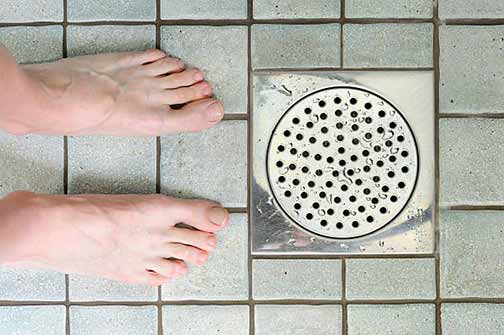
When it comes to maintaining a clean and fresh bathroom, the last thing you want is an unpleasant odor emanating from your shower drain. Not only can it be a nuisance, but it can also make your entire bathroom feel uninviting. Here we will explore the various factors that can cause the unpleasant odor in your shower drain and provide you with some effective solutions to tackle this issue.
Potential Causes of Shower Drain Odor
There are several factors that can contribute to the unpleasant odor in your shower drain. By understanding these causes, you can take appropriate steps to eliminate the odor and enjoy a clean and fresh-smelling bathroom. Let’s take a closer look at some of the common culprits:
Accumulated Hair and Soap Scum
The accumulation of hair and soap scum is one of the primary causes of shower drain odor. As you take showers, hair strands and soap residue can build up in the drain pipes over time. These materials can trap bacteria and other microorganisms, leading to the release of foul-smelling gases.
To prevent this issue, it is important to regularly clean your shower drain. You can use a drain snake or a plunger to remove hair clogs and rinse the drain with hot water to dissolve soap scum. Additionally, using a drain cover can help prevent hair from entering the drain in the first place.
Mold and Mildew Growth
Mold and mildew thrive in moist environments, making your shower drain an ideal breeding ground. These fungi not only cause a musty odor but also pose health risks, especially for individuals with respiratory conditions.
To combat mold and mildew growth in your shower, it is essential to keep your shower area well-ventilated. Open a window or turn on the exhaust fan while using the shower to reduce moisture levels. Regularly cleaning the shower walls and floor with a mildew-resistant cleaner can also help prevent mold and mildew from spreading.
Sewer Gas Leakage
In some cases, the unpleasant odor in your shower drain may be a result of sewer gas leakage. Sewer gas is a mixture of various gases, including hydrogen sulfide, which emits a strong rotten-egg smell. If the plumbing system is not properly sealed or there is a break in the sewer line that needs repairing, sewer gas can enter your bathroom and cause foul odors.
If you suspect sewer gas leakage, it is crucial to seek professional help. A licensed plumber can inspect your plumbing system, identify any leaks or damages, and make the necessary repairs. Addressing this issue promptly is essential for both eliminating the odor and ensuring the safety of your home.
Dry P-Traps
The P-trap is a U-shaped pipe found beneath your shower drain. Its purpose is to prevent sewer gases from entering your bathroom by holding a small amount of water that acts as a barrier. However, if the P-trap dries out, it can no longer effectively seal off the gases, resulting in unpleasant odors.
To resolve this issue, simply run water down the drain regularly to keep the P-trap filled. If you have a shower that is not regularly used, consider pouring a cup of water down the drain every few weeks to ensure the P-trap remains effective.
Mineral Deposits
Mineral deposits, such as calcium and lime, can accumulate in your shower drain over time. These deposits not only hinder proper water flow but can also contribute to the development of odor-causing bacteria and mold.
To remove mineral deposits, you can use a mix of white vinegar and water. Simply pour the solution down the drain and let it sit for a few hours. Then, scrub the drain with a brush to break up the deposits. Rinse thoroughly with water to ensure all residue is cleared.

Freshen Up Your Shower Drain
Now that you are familiar with the potential causes of unpleasant odors in your shower drain, it’s time to take action. Here are some effective solutions to help you freshen up your shower drain and maintain a delightful bathroom ambiance:
Regular Cleaning
Make it a habit to clean your shower drain regularly. This can include removing hair clogs, scrubbing away soap scum, and using a mildew-resistant cleaner to keep mold and mildew at bay. By incorporating these tasks into your cleaning routine, you can prevent the buildup of odor-causing materials.
Drain Maintenance
Perform routine maintenance on your shower drain to keep it in optimal condition. This can involve using natural drain cleaners to dissolve any buildup, checking for leaks or damages in the plumbing system, and ensuring that the P-trap remains filled with water.
Improve Ventilation
Proper ventilation plays a crucial role in preventing the growth of mold and mildew. Ensure your bathroom is well-ventilated by opening windows or using an exhaust fan while showering. This will help reduce moisture levels and keep your shower area dry and fresh-smelling.
Use Natural Deodorizers
If you prefer to avoid harsh chemical-based deodorizers, you can opt for natural alternatives to keep your shower drain smelling pleasant. Baking soda mixed with vinegar can be an effective deodorizing solution. Simply pour the mixture down the drain, let it sit for a while, and rinse with hot water.
Seek Professional Help
If you have tried various solutions but the unpleasant odor persists, it may be time to seek the assistance of a local plumber. They can assess the situation, identify any underlying issues, and provide appropriate solutions to address the problem.
An unpleasant odor in your shower drain can be a frustrating problem to deal with. However, by understanding the potential causes and implementing proactive measures, you can eliminate the odor and enjoy a fresh and inviting bathroom. Remember to regularly clean your shower drain, keep your bathroom well-ventilated, and address any plumbing issues promptly. By doing so, you can bid farewell to pesky shower drain odors and maintain a pleasant bathing experience.

